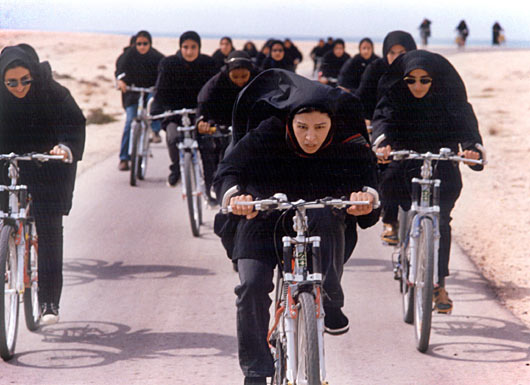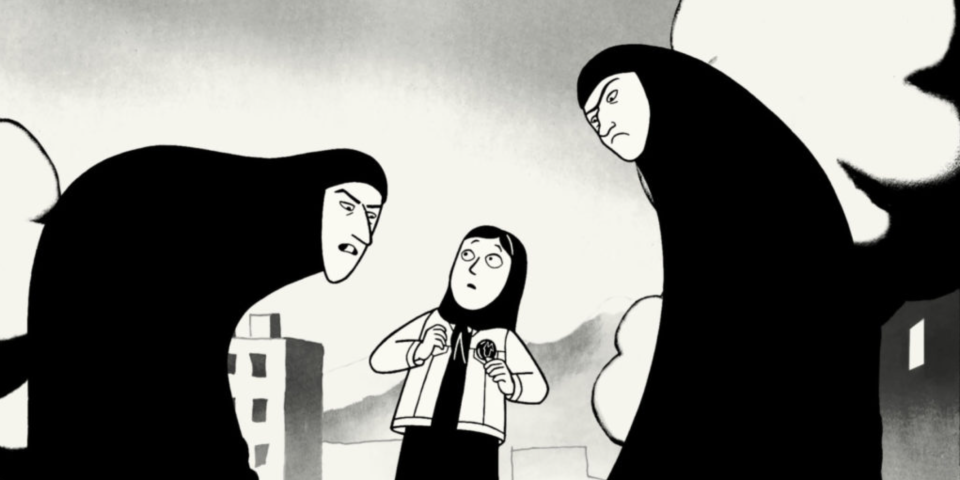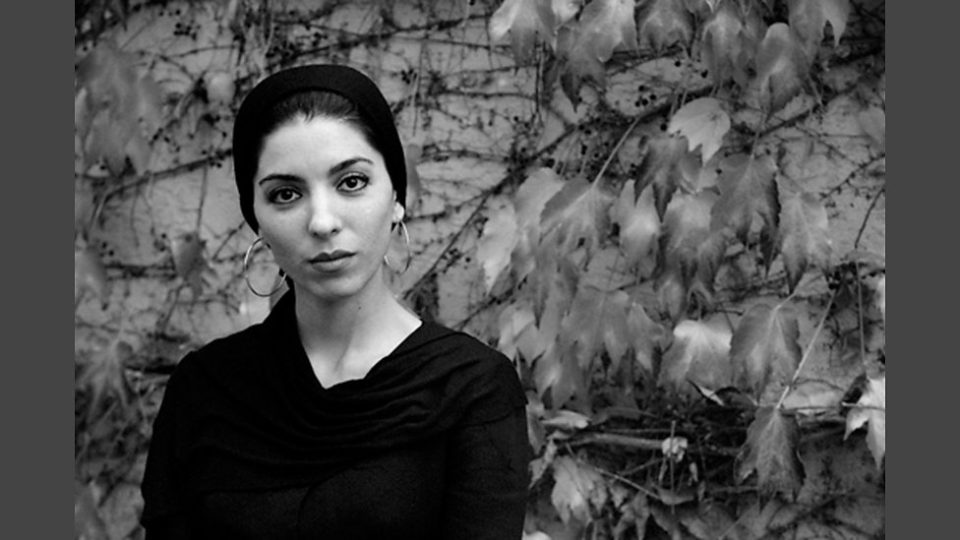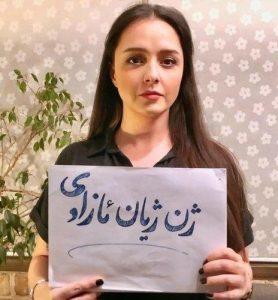
Cracked mirror: The cinema of the infinitely resilient women of Iran
In their films, Iranian filmmakers enter the deepest recesses of the female heart and mind, beyond the darkness of the purdah, exploring the synthesis of their inner courage and infinite resilience

If cinema, like literature, reflects the cracked mirror of society, contemporary Iran is living an everyday cinematic reality, 24×7, though their finest filmmakers are either in prison or in exile. If mourning is a private experience of pain, it is no more so in Iran these days, with the death count of peaceful protesters, especially young women, rising each hour, and thousands condemned in jail.
This is because even when women (along with men) dance, sing, shout slogans, write graffiti and poetry on the walls, break the walls between men and women students in classrooms, make bonfires and hold hands, going round and round in circles, cut their hair in public or wave their hijabs as a symbol of defiance on traffic crossings across the country, it is the funerals and the collective mourning on the 40th day which has become a ritualistic landmark of rebellion, like cinema unfolding in front of the eyes.
On September 13, Mahsa was walking with her brother in Tehran when she was picked up by the notorious morality police, which accused her of not wearing the hijab properly. Three days later, she died after falling into a coma. On October 26, the 40th day of Amini’s murder, which has triggered prolonged and protracted protests seeking systemic change, the police told her Kurdish family to refrain from mourning or else their son would be picked up. Consequently, her mother issued a public appeal asking everyone not to come to her grave on the 40th day of mourning.
Documenting the cracked mirror
On her grave, with barren hills in the distance, the protesters have written, ‘Mahsa is not dead, she lives’. Women had thrown off their hijabs, shouting, ‘She lives, she is not dead’, on the day she was buried, their collective cry and tears choking the arid landscape. On the 40th day, despite her mother’s appeal, and huge police barricades, thousands came to pay homage, and to stand for justice, defying the mighty state apparatus.
Also read: ‘Chhello Show’ director Pan Nalin’s quest to ‘become’ a film
This has become a method in the magical re-enactment of this theatrical spectacle of mass mourning and defiance in Iran, be it the killing of teenager Nika, her head smashed, or the murder of Hadis Najafi, 20, by the cops. She had fixed her golden pony tail with a rubber band, having discarded the hijab, before joining the peaceful protests. Indeed, each moment is soaked with a certain uncanny, intoxicating experience, despite the relentless repression — the bravery and resilience of the women of Iran becoming a glorious moment of everyday history.
Bravery and resilience, between the reality of invisible and expressed life, between manifest and hidden suffocation, between thought and praxis, the classical kaleidoscope of Iranian cinema, often with women as protagonists, behind and in front of the camera, seemed to have captured their heady song of the road since long. Be it Abbas Kiarostami, Jafar Panahi (62), Majid Majidi (63), Asghar Farhadi (50) or the House of the Makhmalbafs, with its brilliant women filmmakers, among others, Iranian filmmakers have entered the deepest recesses of the female heart and mind, inside and outside the walls of the house, beyond the darkness of the purdah, and have explored the longings, the synthesis of despair and optimism, the dreams and fantasy, their inner courage and infinite resilience. In film after film, they have documented the cracked mirror that is the cinema of the incredible women of Iran.
The epical river of women’s suppressed angst and anger
In the much-acclaimed episodic film, ‘The Day I Became a Woman’ (2004), directed by Marzieh Meshkini, with a remarkable script by another great filmmaker, Mohsen Makhmalbaf (both in exile), there are three stories, and each anticipate the current crescendo of women’s suppressed angst and anger now flowing like an epical river across the lanes and by-lanes of Iran.

‘Ahoo’, the second episode, centers on Ahoo (Shabnam Toloui), a young woman in burqa, who is part of a cycle race event, cycling fast, as if possessed, as if wanting to escape once and for all, into the landscape, along with scores of women cycling behind her. Her husband is chasing her on a horse, a brazen symbol of masculine machismo and power when compared to her humble cycle. He is violently angry: ‘‘If you don’t get off right away, I’ll deal with you right now…’’
Other men, bare-bodied, are chasing her on horseback, shouting: ‘‘Don’t drag us into this. Get off and take care of your life.’’ She does not care. She races on, pedalling fast, her hijab flying in the wind, her beautiful face resplendent with the transparent colours of emancipation and defiance.
Also read: How ‘Joyland,’ Pakistan’s Oscars entry, breaks taboos, tackles homophobia
Samira Makhmalbaf (42) has made out-of-the-box films in difficult terrain, often taking great risks. Her film, ‘At Five in the Afternoon’ (2003), shot in ravaged Afghanistan with women shackled, is like remembrance of things past and future in her own country, Iran. The film is about a schoolgirl, Norgeh, who is sent to a religious school but who sneaks out into a girls’ school which allows her to doubt everything and discover the liberation of knowledge. Indeed, she hides a secret dream: she wants to become the President of Afghanistan. Samira once said, ‘‘I want to reduce the pain of humanity through my films… There are things in this world that are very cruel.’’
When the forbidden becomes a paradise
Marjane Satrapi (53) was a little girl when the Shah was overthrown and the religious fundamentalists took over. She was a defiant kid, wearing jeans and t-shirts with rebellious messages, and openly flouting the dress code ordered by the new regime led by Ayatollah Khomeini. So her parents packed her off to Vienna when she was 14.

Defiant as ever, she refused to accept the ‘deportation’ to an alien culture and returned to Iran. She was sent off again. And then began her journey as a fabulous graphic artist, filmmaker, illustrator and author of children’s books. She is now based in Paris. Her graphic novel, ‘Persepolis’ (2008), depicting the political and cultural backdrop during the reign of Shah, with its western freedoms, and the transition to the suffocation of patriarchy and oppression under the new Islamic regime, has become a classic in modern world literature. The films, adapted from her graphic novels, have been a big success globally, but like most great Iranian cinema, they have been banned in her own country.
In an interview in December 2007, Satrapi said, ‘‘It is a question of human nature. When they forbid it, you want it. I thought discotheques were the worst places in the world, but when it’s forbidden, it becomes a paradise…’’
Great actress Catherine Deneuve (79), a favourite in the surreal films by Luis Bunuel, gave the voice for a character in the film, ‘Persepolis’. She said, ‘‘It’s an unusual story. It’s so personal and so original and so strong — so simple and so strong at the same time. And I think anybody can relate to the fear that you are being abandoned.’’ (She was referring to how Satrapi was packed off to a school in Vienna.)
The dream of a peaceful revolution
Among other great women filmmakers in Iran, both Marva Nabili and Rakhshan Banietemad have made critically acclaimed movies, exploring the female expanse with its deep complexity with female protagonists. Iranian iconoclast Forough Farrokhzad’s life was cut short after she died in a car accident at the age of 32 in 1967, but her lone short film, ‘The House is Black’ (1962), which is focused on a leper colony, is considered to be a masterpiece of Iranian cinema; it subverts social mores and lends humanist but unsentimental grace to the subject.
Jafar Panahi made a great comedy-spoof which has won many awards across the globe. His film, ‘Offside’ (2006) celebrates football in Iran and points out cryptically how women are prohibited to watch matches in the stadium. One girl sneaks in, dressed as a boy, is found out, punished and put in a sort of detention centre inside the stadium, with the soldiers themselves finding the whole affair utterly absurd, even as other women fans are picked up and detained. The film ends with Iran winning with a lone goal against Bahrain in a qualifying World Cup match, and celebrations on the streets, with the cops and the girl-prisoners too joining the festivity which erupts in Tehran.

Panahi, an outspoken voice for democracy and freedom of expression, is currently in jail, along with two other internationally acclaimed filmmakers: Mohammad Rasoulof (50), who made ‘There is No Evil’ two years back, which won the Berlin Golden Bear Award; and Mostafa Aleahmad, maker of ‘Poosteh (2009)’. They are among scores of artists, intellectuals and thinkers now rotting in prison. However, all of them seem unrepentant, stoic and steadfast in their defiance, and in chasing the dream of freedom and a democratic Iran.
On November 9, Taraneh Alidoosti (38), one of Iran’s most prominent actors, in apparent act of defiance, posted an image of herself on Instagram, without the mandatory hijab, and with a sign bearing the original Kurdish version of the ‘woman, life, freedom’ (zhan, zhian, aazadi) slogan, in support of the ongoing protests in Iran, which have seen scores being killed or arrested in the crackdown. Alidoosti has starred in films by award-winning director, including Asghar Farhadi’s ‘The Salesman’, which won the Oscar for best foreign language film in 2017.
The Iranian filmmakers behind bars are like the infinitely brave women of Iran on the screen of brilliant Iranian celluloid. Inside invisible, enclosed spaces. And now on the streets and crossings, dancing and singing, fighting against all odds, celebrating the spectacle and the dream of a peaceful revolution against a short, brutish and nasty regime.


